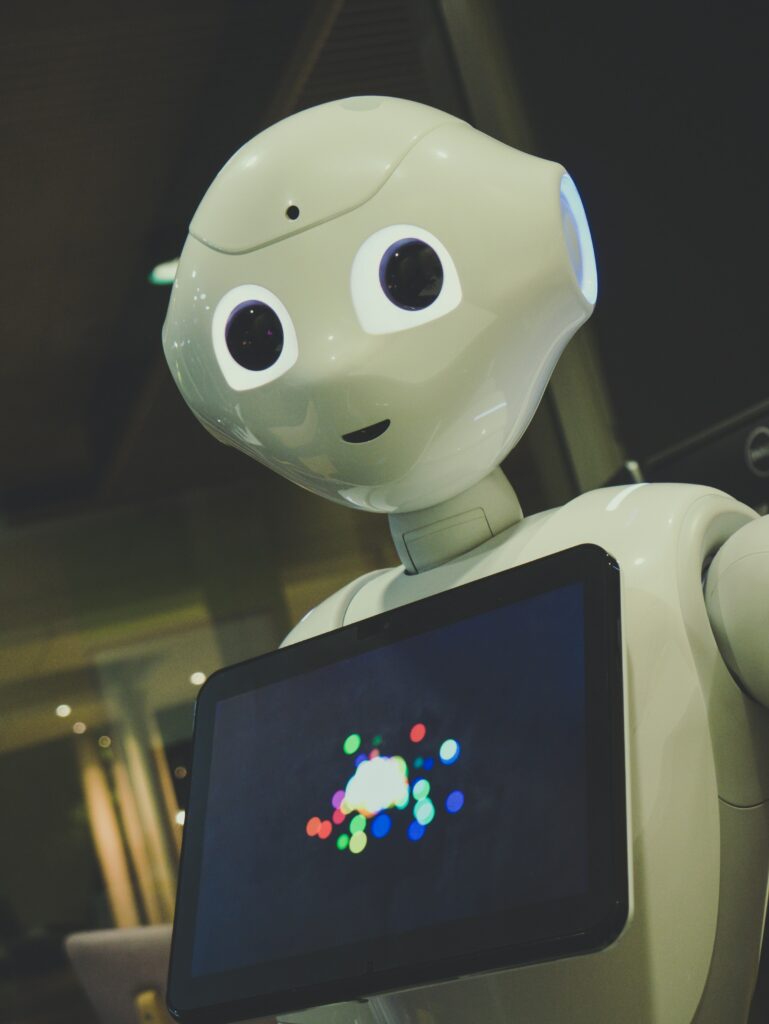AI chatbots in customer service will experience a rapid upswing in 2024. These virtual assistants, empowered by Conversational AIare transforming the way companies communicate with customers. They not only offer round-the-clock support, but also enable personalized interactions in real time.
Advances in natural language processing and machine learning are enabling AI chatbots to have complex conversations. They integrate seamlessly into various industries and significantly improve the customer experience. Their importance goes far beyond simple tasks.
One notable example is Kyana Assist, the AI chatbot from Koenig & Bauer. It uses the AI language model 'Gemini Pro' from Google and offers precise solutions for production situations. Kyana Assist is continuously improving its accuracy and provides multilingual support for the onboarding of new employees.
Important findings
- AI chatbots offer 24/7 availability and personalized interactions
- Advances in NLP and machine learning enable complex conversations
- Small language models prove to be more effective than large models
- AI chatbots lead to cost savings and improve the Customer satisfaction
- You collect valuable data to analyze customer behavior and trends
The importance of AI chatbots in modern customer service
AI chatbots have the Customer service revolutionized. They offer round-the-clock support and make it possible to Automated customer communication at the highest level. The streaming provider RTL+ achieved an impressive case deflection rate of 80% using an AI chatbot compared to conventional contact forms.
Acceptance of this technology is steadily increasing. According to a 2024 Trendmonitor study, one in three Germans have a positive attitude towards communication with intelligent chatbots. This shows the growing trust in the natural language processing of these systems.
AI chatbots not only improve customer relationships, but also increase the competitiveness of companies in the digital world. They offer:
- 24/7 availability
- Personalized support
- Increased efficiency in customer service
- Cost reduction through automation
The integration of AI chatbots into existing customer service structures enables companies to respond to customer inquiries faster and more efficiently. Through continuous learning from interactions, these systems are constantly improving and offer increasingly precise and relevant answers.
AI chatbots are not just a trend, but a necessary development in modern customer service. They enable companies to meet rising customer expectations and work more efficiently at the same time.
Technological basics: How AI chatbots work
AI chatbots are revolutionizing the way companies interact with their customers. They use advanced technologies to enable dialog-based experiences and manage complex customer interactions.
Machine learning and natural language processing
Machine learning is at the heart of AI chatbots. This technology enables the bots to learn from every interaction and continuously improve their performance. By processing large amounts of data, they recognize patterns and understand customer needs better and better.
The natural language processing (NLP) plays a crucial role. It enables chatbots to understand the nuances of human language and generate contextual responses. This leads to more precise and relevant interactions.
Comparison: rule-based vs. AI-based chatbots
| Rule-based chatbots | AI-based chatbots |
|---|---|
| Limited answer options | Dynamic interactions |
| Simple requests | Complex requests |
| Static knowledge base | Learning systems |
Hybrid solutions for optimum results
Hybrid solutions combine the strengths of both approaches. They utilize the reliability of rule-based systems for standard requests and the flexibility of AI for more complex situations. This enables an optimal balance between efficiency and Contextual intelligence.
https://www.youtube.com/watch?v=Vf_tWT68YXU
The integration of machine learning in chatbots opens up new possibilities in customer service. It not only enables a 24/7 service with fast and relevant answers, but also supports companies in scaling their business processes.
AI chatbots customer service: revolutionary changes
AI chatbots are fundamentally changing customer service. A study shows that 45% of customer service decision-makers will be using AI in 2022 - an increase of 88% since 2020. This development brings numerous benefits.
The Chatbot implementation enables round-the-clock support. Customers receive quick answers without long waiting times. This increases satisfaction and loyalty. At the same time, it relieves employees of routine tasks.
Another advantage is the Omnichannel support. AI chatbots can process inquiries via different channels. They ensure a consistent customer experience and enable cost-effective scaling. Companies do not need to hire more staff for this.
The technology uses machine learning and natural language processing. Chatbots understand the context and give appropriate answers. They are constantly learning and improving themselves. This leads to continuous optimization of customer service.
| Advantages | Effects |
|---|---|
| 24/7 availability | Higher customer satisfaction |
| Fast response times | Reduced waiting times |
| Omnichannel support | Consistent customer experience |
| Automation of routine tasks | Relief for employees |
AI chatbots are revolutionizing customer service by increasing efficiency and cutting costs. They enable personalized and fast support around the clock. Companies that use this technology gain a clear competitive advantage.
Advantages of AI chatbots for companies
AI chatbots are revolutionizing customer service thanks to their many advantages. They enable efficient Customer service automation and at the same time offer valuable insights through Conversation analysis.
Cost efficiency and scalability
Companies benefit considerably from the cost efficiency of AI chatbots. The investment costs are amortized after just one year. In the long term, they are cheaper than human employees for comparable tasks. An external call center employee costs an average of €42.45 per inquiry. AI chatbots reduce these costs significantly.
Improving customer satisfaction
AI chatbots significantly increase customer satisfaction. They enable a personalized approach and improve the user experience. Photobucket recorded a three percent increase in the customer satisfaction index after implementing chatbots. Chatbots can also improve first-time resolution times by up to 17 percent.

24/7 availability and fast response times
A key advantage of AI chatbots is their constant availability. They offer quick responses to customer inquiries around the clock. This is particularly important as processing time is a decisive factor for customer ratings. 63 percent of companies report a 40 percent reduction in processing time through the use of chatbots.
| Advantages | Statistical data |
|---|---|
| Increased efficiency | 81% of companies report improved efficiency |
| Cost savings | Amortization of investment costs after one year |
| Customer satisfaction | Increase in CSAT by up to 12% |
| Processing time | Reduction by 40% for 63% of the companies |
Integration of AI chatbots into existing customer service structures
The Chatbot implementation into existing customer service structures requires careful planning and implementation. Companies need to consider various aspects to ensure seamless integration and maximize added value for customers.
A decisive factor is user-friendliness. The chatbot's interface should be intuitive so that customers can interact with it effortlessly. At the same time, technical integration must be smooth, with the chatbot communicating seamlessly with existing CRM or ERP systems.
Data protection plays a central role in the integration of AI chatbots. Companies must ensure that the highest GDPR standards are adhered to in order to maintain customer trust and minimize legal risks.
For a successful Chatbot implementation it is advisable to choose an AI provider with 'no-learning effect'. This enables rapid implementation and continuous adaptation to changing market conditions.
The integration of AI chatbots into the Omnichannel support is another important aspect. Customers today expect a seamless experience across different communication channels. According to a study, 51% of consumers want the ability to easily switch to a human customer service representative when needed.
Despite the benefits of AI chatbots, the human factor remains important in customer service. 75% of consumers still find interpersonal contact important, even when chatbots are used. A balanced mix of AI support and human interaction is therefore the key to an optimal customer experience.
Personalization and contextual responses through AI
AI chatbots are revolutionizing customer service with their ability to provide personalized and contextualized answers. The Contextual intelligence of these systems enables them to precisely identify customer needs and offer customized solutions.
Data analysis for customized customer experiences
Through advanced Conversation analysis AI chatbots can process large amounts of data in real time. This leads to a deeper understanding of customer behaviour and enables personalized interactions. According to a study, 63% of executives stated that AI can provide hyper-personalized customer experiences.

Continuous improvement through the ability to learn
AI chatbots are constantly learning and improving their skills. They adapt to new situations and optimize their responses based on previous interactions. This ability to learn leads to a constant increase in the accuracy and relevance of their responses.
Proactive service and churn prevention
AI chatbots can use predictive analysis to identify potential customer churn at an early stage and take countermeasures. They proactively offer solutions and thus improve customer loyalty. An effective Conversation analysis makes it possible to anticipate customer concerns and act preventively.
| Advantages of AI chatbots | Percentage |
|---|---|
| Improving customer satisfaction | 62% |
| Contribution to CX continuity | 70% |
| Prioritization of AI in CX | 72% |
The future of customer service lies in the intelligent use of AI chatbots. They not only offer efficient solutions, but also create personalized and valuable customer experiences.
Challenges and limitations of AI chatbots in customer service
AI chatbots are revolutionizing customer service, but they also have their limits. Despite impressive advances in emotional intelligence, they cannot fully grasp complex human emotions. A study shows that 56% of consumers are skeptical as to whether chatbots can really understand their concerns.
Chatbot limitations are particularly evident in unpredictable situations. 33% of users believe that chatbots are more prone to errors than human employees. Nevertheless, 58% appreciate the constant availability and 50% the faster response times.
Another problem is "hallucinations" - chatbots can occasionally generate misleading information. This underlines the need to see AI as a supplement to, rather than a replacement for, human employees.
| Aspect | Positive | Negative |
|---|---|---|
| Availability | 58% appreciate 24/7 service | 20% completely reject AI chatbots |
| Response time | 50% see faster reactions as an advantage | 33% consider chatbots to be more error-prone |
| Understanding | 33% welcome AI in customer service | 56% Doubts about ability to understand |
Despite these challenges, many companies see the potential of AI chatbots. 31% of consumers believe that companies will benefit from relieving the burden of human support. The future lies in the balance between AI efficiency and human empathy.
Future trends: AI chatbots and the transformation of customer service
The future of customer service is dominated by AI chatbots. According to Gartner, chatbots will become the main service channel for a quarter of all companies by 2027. This development is being driven by the increasing demand for personalized support. Virtual assistants are revolutionizing the way companies interact with their customers.
Advances in natural language processing
Conversational AI is making great progress. The integration of AI into omnichannel strategies enables seamless transitions between different communication channels. Customers can easily switch from WhatsApp to Facebook Messenger without interrupting the flow of conversation. This flexibility significantly increases customer satisfaction.
Integration of emotional intelligence
Future AI chatbots will not only process requests, but also recognize and respond to emotions. These emotional intelligence improves the customer experience. Companies that focus on experiences are more profitable than their competitors, according to statistics 60 %. The integration of CRM platforms continues to drive the development of chatbots.
Omnichannel support and seamless transitions
The future belongs to cross-platform bots. They communicate via various channels and adapt to customer preferences. With 93 % of customers spending more with companies that offer chat support, investing in this technology is becoming a must. Virtual assistants are becoming indispensable partners that help companies to remain competitive in a rapidly changing environment.


Recent Comments